Profiles from Asian Countries
Preventing Ethnic Cleansing
Bir Duino (Kyrgyzstan)
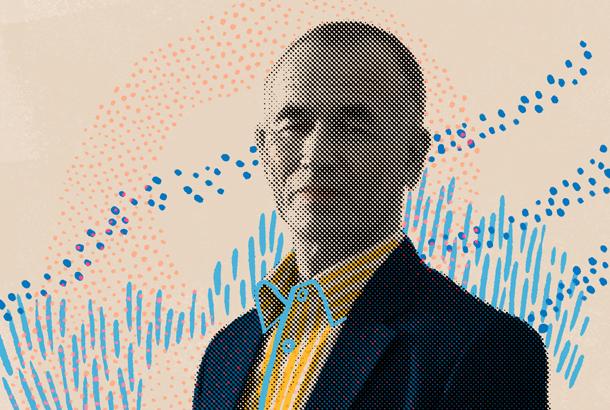 Azimjan Askarov (illustration by Vérane Cottin, photograph by Bir Duino)
Azimjan Askarov (illustration by Vérane Cottin, photograph by Bir Duino)
Azimzhan Askarov, a Kyrgyz activist and journalist, had been serving a life sentence for his alleged participation in the murder of a policeman during the 2010 protests against ethnic cleansing.
An ethnic Uzbek, Askarov had been runningVozduh, a human rights organization, through which he documented and published critical articles about police brutality, the mistreatment of prisoners and the displacement of thousands of Kyrgyz citizens like him.
For 10 years, Kyrgyz authorities ignored the United Nations and other international bodies’ conclusions that Askarov had been arbitrarily arrested, tortured and denied a fair trial. He died in his prison cell in July 2020 from conditions attributed to COVID-19.
“Kyrgyzstan must demonstrate that it is willing to uphold human rights through its protection of human rights defenders and ethnic minorities," said Mary Lawlor, the United Nations Special Rapporteur on the situation of human rights defenders. For its part, the United Nations Human Rights Committee described his death as “a stain” on the post-Soviet country's rights record.
Never Giving Up
Throughout his detention and torture, Askarov was represented by the human rights organization Bir Duino-Kyrgyzstan. With financial support from the United Nations Voluntary Fund for Victims of Torture, Bir Duino monitors the implementation of civil, political, economic, social and cultural rights in Kyrgyzstan and advocates for the protection of those involved, including by providing legal representation to victims of torture who cannot afford it.
Bir Duino says it has suffered reprisals for disagreeing with the government: police raids of its offices; confiscation of reporting equipment; arbitrary arrests of its lawyers, among other measures.
But Bir Duino will not back down, agreeing to represent Askarov’s widow, Khadicha Askarova, in an inquiry into her husband’s death.
“We believe that the events that have taken place have become a negative precedent for the use of power and political influence to… put pressure on the freedom of speech and democracy,” said Tolekan Ismailova, Bir Duino’s director.
“I would like to reiterate the importance of real solidarity and support in order to positively change the environment for the better,” she said.
Bir Duino-Kyrgyzstan received its first grant from the United Nations Voluntary Fund for Victims of Torture in 2018.
Protecting Citizens from Excessive Force
Kazakhstan International Bureau for Human Rights and the Rule of Law (Kazakhstan)
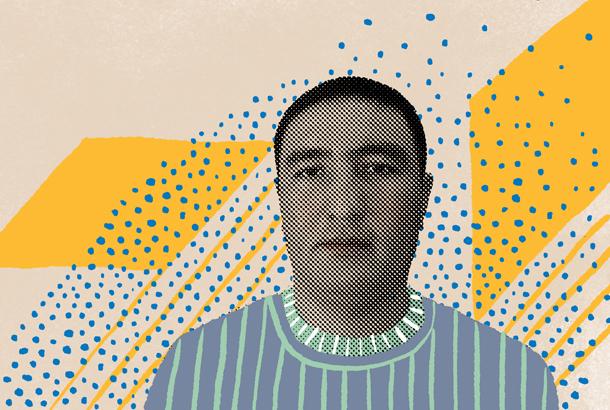 Olzhas Turysbekov (illustration by Vérane Cottin, photograph by KIBHR)
Olzhas Turysbekov (illustration by Vérane Cottin, photograph by KIBHR)
In April 2016, Olzhas Turysbekov, a 26-year-old Kazakh resident and one of the leading players in the Kazakh national play Kokpar, was ordered by police to come to the community office.
At the community office, he was threatened and physically abused by several police officers.
Turysbekov knew he had done nothing wrong, so he turned to the Kazakhstan International Bureau for Kazakhstan Human Rights and the Rule of Law (KIBHR), a coordinator of the Kazakhstani NGOs Coalition against Torture. KIBHR provided him with an attorney and transportation costs during a civil lawsuit for physical and mental damages.
Established in 1993, KIBHR combats police impunity in Kazakhstan, which the UN Committee on Enforced Disappearances raised as a concern in 2016. With ten regional branches in the country and about 53 members in the Anti-Torture Coalition, KIBHR promotes the protection of civil and political rights. Further, the organization contributes to democratic development, the rule of law, and civil society building through education, monitoring and advocacy. In August 2017, Turysbekov saw a court find three officers responsible for physical and mental damages. The court sentenced them to three years in prison and barred them from holding jobs in civil services and law enforcement for an additional three years.
“I've never dealt with law enforcement bodies. And only during the case did I realize how hard it is to go against the system,” Turysbekov said. “These are the people who returned my soul, returned my faith, who went with me, proving that I was a victim of torture. I realized that the best rehabilitation is a belief in justice.
“We restored justice. This is what brought me back to a normal and fulfilling life.”
The Need to Protect
In January 2022, UN human rights experts called on the Kazakhstan authorities and security forces to halt their unrestrained use of force, including lethal force, against protesters. The experts were profoundly concerned that Kazakhstan's President reportedly gave orders to "open fire with lethal force" against protesters and urged authorities to ensure the well-being and fair treatment of the thousands of individuals detained since the protests began.
The troubling events brought in sharp relief the vital role played by KIBHR. “We are able to provide professional legal, medical, and psychological assistance on a permanent basis not only to the victims of torture but also to their relatives,” said Roza Akylbekova, the acting director of KIBHR.
“When I was taken outside and saw my mother, I lost consciousness. I don’t know why it happened, whether it was from pain, or from the fact that I saw some kind of hope,” Turysbekov said. “I am very grateful to those people who were near.”
The Kazakhstan International Bureau for Human Rights and the Rule of Law (KIBHR) received its first grant from the United Nations Voluntary Fund for Victims of Torture in 2010.
Rebuilding Lives from Rubble
Gaza Community Mental Health Programme (The State of Palestine)
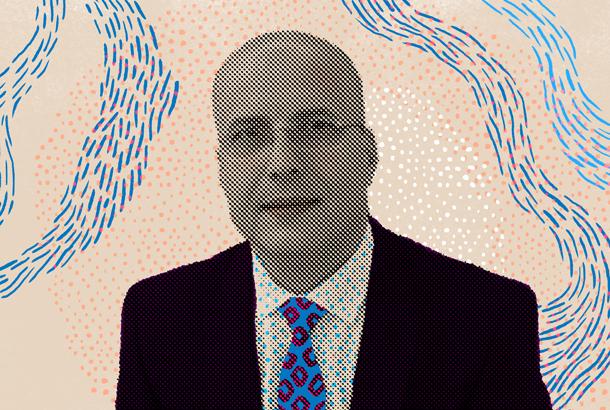 Hasan Zyada (illustration by Vérane Cottin, photograph by GCMHP)
Hasan Zyada (illustration by Vérane Cottin, photograph by GCMHP)
Ali* was tortured during the six years he spent in an Israeli prison — most of them in solitary confinement — his pillow as his only comfort. In 2019, several UN experts said that they were very concerned about serious gaps in Israel's laws and practices that may be in violation of an absolute prohibition of torture or cruel, inhuman or degrading treatment or punishment. “They slapped me violently because they didn’t like what they called my defiant look,” Ali said.
Upon his release, he started smoking five packs of cigarettes a day, couldn’t eat, couldn’t sleep and on many occasions — much to his family’s concern — said nonsensical things. Worried about his psychological wellbeing, his family referred Ali to the Gaza Community Mental Health Programme (GCMHP)where he was diagnosed with delusional disorder. GCMHP started him on drug therapy and provided supportive counselling for both Ali and his family.
Reintegrating Palestinian detainees
Established in 1990, GCMHP aims to improve the mental health of members of the Palestinian community by providing clinical, social, research and training services, in addition to gathering support and advocating for victims of violence and human rights violations. The United Nations Voluntary Fund for Victims of Torturehas supported GCMHP since 2009 in re-integrating torture victims into society and breaking the cycle of abuse that leads to mental health problems.
Mental health care has been a significantly neglected area in the Palestinian health system. In 2018, the Special Rapporteur on the situation of human rights in the Palestinian territories described a mental health system that is increasingly ill-equipped to provide greatly needed support and resources. For more than 30 years, GCMHP has mobilized mental health professionals, including psychiatrists, psychiatric nurses, psychologists and social workers, to fill that gap. GCMHP has also widely used media to spread awareness of torture and its impact on both the individuals and the community, resulting in limits on the use of torture and reinforcing the government’s responsibility towards stopping this inhumane practice.
“I felt emotionally rewarded when victims tell me that I have brought them back to real life,” said Hasan Zyada, a psychologist.“For many days I kept reflecting on this statement and I will keep remembering it. It is such a great thing to give people hope and relief.”
The Gaza Community Mental Health Programme (GCMHP) received its first grant from the United Nations Voluntary Fund for Victims of Torture in 1989.
Defending Iraqi Citizens from Government Abuse
Democracy and Human Rights Development Center (Iraq)
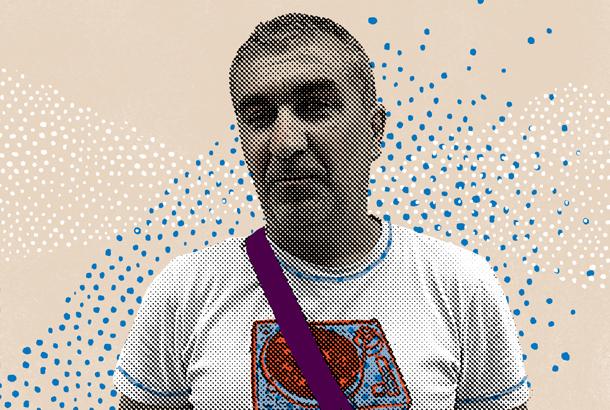 Amir (illustration by Vérane Cottin, photograph by DHRD)
Amir (illustration by Vérane Cottin, photograph by DHRD)
Amir*, a Kurdish and Iraqi man with disability, was detained in a police station in the Kurdistan region of Iraq when he was subjected to torture by police officers.
“I was summoned to the police station by a police officer and tortured… They threatened me and my family and children,” Amir said.
A report by the United Nations Assistance Mission for Iraq (UNAMI) found a consistent lack of respect for procedural safeguards. Several survivors indicated in court that their confessions had been extracted under torture. UNAMI also observed that safeguards in place to prevent torture, including medical exams, access to defence lawyers, and video-recording of interrogations were disregarded.
After his release, Amir enlisted the legal team from Democracy and Human Rights Development Center (DHRD) to seek justice.
“I have been an activist and lawyer for nearly 20 years, and I have seen, over and over, that torture victims are in a disadvantageous position due to loopholes and deficiencies in the judiciary and rule of law system here that allow torture and makes it extra difficult to hold the perpetrators accountable,” said Karzan Fadhil, a lawyer and head of the DHRD in Sulaimani, Iraq.
DHRD was founded in 2002 to further develop the principles of civil society and equality, advocate for changes in laws to align with human rights principles, support those who do not benefit from adequate protection under Iraqi law, and seek compensation for the wrongly accused. DHRD has been providing direct legal assistance for torture victims since 2013, and has led capacity building training courses on the United Nations Convention against Torture, the “Istanbul Protocol” to document torture, and the psychological and physical impacts of torture acts on victims.
Expanding the Capacity for Justice in Iraq
With grants from the United Nations Voluntary Fund for Victims of Torture, DHRD has been able to improve the quality of its legal services, expand into case management, psychosocial support, medical, and psychological referral services. DHRD has also formed a special board for supporting women in jail, translated brochures and books about torture for the general public and acted as a judiciary watchdog.
“As a lawyer and an activist what motivates me the most are my belief in human rights principles and my faith in change,” Karzan said. “It is the work of lawyers and activists like me that contribute to improving the situation.”
For Amir, the DHRD lawyers registered complaints against the perpetrators, provided legal counsel and represented him at several trials. The Iraqi Criminal Court convicted the perpetrators to six months in prison and awarded the victim the right to request financial reimbursement.
“They were with me from the beginning of my case till the end,” Amir said. “I thank them.”
The Democracy and Human Rights Development Center (DHRD) has been a beneficiary of UN Voluntary Fund for Victims of Torture since 2018.
Protecting Government Critics
Medical Action Group (Philippines)
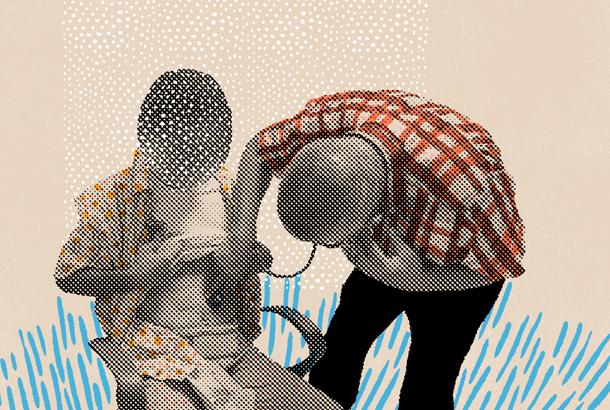 Torture survivor and a doctor (illustration by Vérane Cottin, photograph by MAG)
Torture survivor and a doctor (illustration by Vérane Cottin, photograph by MAG)
Ahadas* recalls that in 2011 50 members of the Armed Forces of the Philippines kidnapped him and brought him to a military camp, where he was tortured and interrogated. The Medical Action Group (MAG), an independent health and human rights NGO, found Ahadas in a hospital with burns, cuts, bruises and other signs of intense abuse.
Throughout his stay in custody, MAG regularly provided Ahadas with medical and judicial services until he could return to construction work outside the Philippines. "MAG helped from my imprisonment until I was proven innocent,” Ahadas said. “MAG still supports me now that I am seeking justice for the torture done to me."
Instruments of Care
Founded in 1982, at the height of the regime of former president Ferdinand Marco, MAG brought together doctors of all specialties to provide aid to victims of political repression and their families. In 2019, UN human rights experts noted a sharp deterioration in the situation of human rights across the country, including cases of arbitrary detention, torture, and inhuman or degrading treatment.
With grants from the United Nations Voluntary Fund for Victims of Torture, MAG has been able to expand its services, improve its capacities, provide investigative information on the conditions faced by victims of torture, and advocate for laws in compliance with the United Nations Convention against Torture. Among other things, MAG has conducted virtual medical screenings with political prisoners in local jails, distributed hygiene kits to citizens under house arrest and undertaken medical missions for human rights defenders.
In addition to helping the victims and survivors of torture manage their mental and physical after-effects, MAG also provides legal restitution. One of its most successful cases concerns the Manalo brothers, Raymond and Reynaldo, who were abducted from their home and held in secret detention for 18 months by the Philippine Army. After managing to escape, Raymond accused his captors of using torture in a campaign against the communist New People’s Army. The case reached the Philippines’ Supreme Court, which upheld the conviction and sentencing of former Filipino Major General Jovito Palparan to life imprisonment for his involvement.
“Physicians and other healthcare professionals can play an important role to not only prevent torture but to help victims and their families seek justice,” said Dr. Amarylis Abcede, the program manager for MAG. “MAG doctors and staff are considered truth-tellers, we are considered friends of the court. We take our responsibilities as instruments of care and shoulder the continuum of care of torture victims from treatment to rehabilitation to reconstitution.
“We know we can make a difference both as clinicians and advocates for public health and human rights.”
Medical Action Group (MAG) received its first grant from the United Nations Voluntary Fund for Victims of Torture in 1981.
Inspired survivor pays it forward
Cross-Cultural Foundation (Thailand)
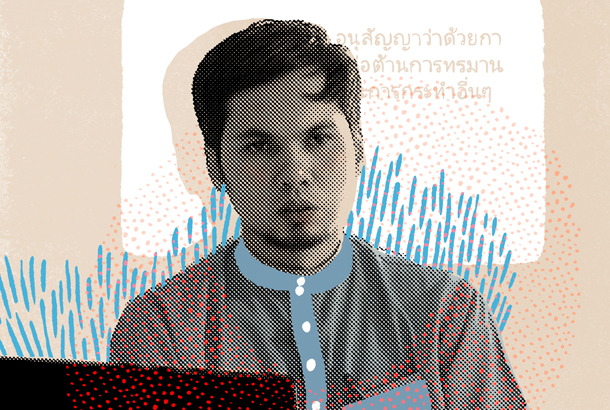
Abdulloh Ngoh (illustration by Vérane Cottin, photograph by Cross-cultural centre)
Abdulloh Ngoh was arbitrarily detained three times between 2009 and 2013. Under Martial Law, declared in 2004 in Thailand, individuals can be held in custody for up to 37 days without being charged. NGOs say they have documented cases of torture, enforced disappearances and extrajudicial killings of Malay-Muslims in custody.
“You don’t get to have your lawyer or people that you trust during interrogation, which opens the door to all kinds of human rights violations,” said Ngoh.
The Southern Thai Insurgency is a decades-long conflict between the ethnic minority and the state. UN human rights mechanisms have long voiced concerns about a pattern of violence against the minority. Malay-Muslims say that, under the guise of national security, counterinsurgency laws are merely the newest method for the authorities to discriminate against the minority.
Following his imprisonment, the Cross-Cultural Foundation (CrCF) helped Abdulloh Ngoh transform his life. Assisted by the United Nations Voluntary Fund for Victims of Torture, they educated Abdulloh on his rights and helped him confront his trauma. CrCF also aided him in filing a complaint with Thailand’s National Human Rights Commission, on behalf of a group of survivors.
Empowered by the support, Abdulloh went on to create YASAD, an NGO that works in partnership with CrFC. “When I think of other torture survivors, it gives me the energy and strength to continue,” says Ngoh.
Like CrCF, YASAD documents the abuses perpetrated against Malay-Muslims and provides legal assistance to the victims.
Aligning domestic law with international standards
Founded in 2002, CrCF offers social, psychological and legal help to those victims of torture and enforced disappearance associated with the Southern Thai Insurgency.
CrCF is currently investigating accusations that the state is now racially profiling Malay-Muslims via their biometric data. In 2021, the United Nations Committee for the Elimination of Racial Discrimination expressed concern about the mass-collection and use of DNA samples from ethnic groups in southern border provinces. In the deep south, this information is required for SIM card registration so, rather than be detained again, Ngoh must go without modern communication.
They have also been integral to the progress of the Prevention and Suppression of Torture and Enforced Disappearance Bill. If passed, this would codify into domestic law the respective international conventions to which Thailand is party. An official has yet to be prosecuted for torture or enforced disappearance.
“We want human rights to be tangible,” says Anchana Hemmina, a member of CrCF’s network. “With this knowledge, the local people will understand they need to respect each other regardless of their religion.”
CrCF received its first grant from the United Nations Voluntary Fund for the Victims of Torture in 2013.
Ministering to Civil War Victims
Human Rights Office Kandy Diocese (Sri Lanka)
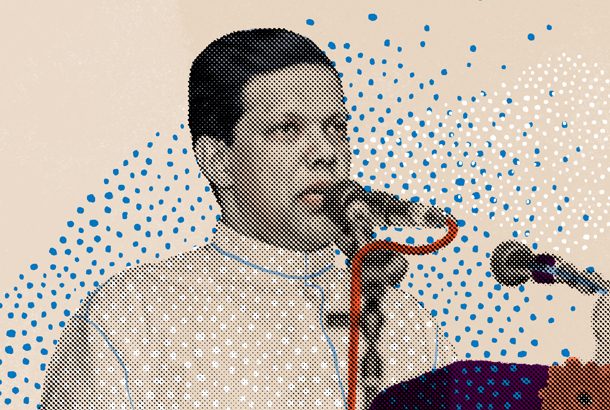
Father Nandana Manatunga (illustration by Vérane Cottin, photograph by Human Rights Office Sri Lanka)
Father Nandana Manatunga is everywhere and nowhere at the same time. One minute, he will be in his office, consoling crying relatives of those abducted by armed groups. The next hour, he could be walking through police stations and army camps seeking the disappeared or trying to release them from military custody.
As the director of the Human Rights Office in Kandy, Father Manatunga keeps his whereabouts unknown. He says he is under constant threat of death for defending the human rights of his people, particularly ethnic Tamils.
“Torture continues and police brutality more than ever," Father Manatunga told an independent Catholic newspaper. “The rise of nationalist campaigns over the recent months continue, so the government is slow in respecting the rights of the Tamils and other minorities.”
Sri Lanka’s civil war between the Liberation Tigers of Tamil Elam (LTTE), which had hoped to establish a separate state for the Tamil minority, and the government officially ended in 2009. According to a 2021 UN Human Rights Council report, nearly 12 years after the armed conflict, impunity for human rights violations by all sides is more entrenched than ever, with the current government obstructing investigations and trials, and reversing the limited progress that had been made. Moreover, successive UN reports have documented abuses including extrajudicial killings, enforced disappearances, arbitrary detention, torture and sexual violence affecting Sri Lankans from all communities, but particularly minorities like the Tamils.
A Priest with Purpose
Manatunga heads the Human Rights Office of Kandy Diocese. With funding from the United Nations Voluntary Fund for Victims of Torture, it provides torture victims with security and protection as well as legal, medical, psychological and educational assistance. The organization pledges to “journey with the torture victims and their families until the victims are integrated to the society.”
Ordained in 1986, Manatunga has seen much of the 26-year fighting that claimed the lives of at least 40,000 civilians in its final days alone. In addition to facing threats from police and other groups, Manatunga had to navigate criticism and skepticism from some fellow priests and Church leaders as he challenged them to be more active in fighting abuses.
But the work of Manatunga and his team has not only stabilized the health and financial positions of the families of the disappeared, but also established welfare programs within prisons, greater awareness of human rights among young people and secured several landmark convictions against perpetrators of rape and torture.
“Most of the victims die with their story. They don't want to fight the police and they don't want to follow tedious legal procedure," Father Manatunga said. "What we want to do is empower these children, give them the courage and moral support to break the silence."
The Human Rights Office Kandy Diocese received its first grant from the United Nations Voluntary Fund for Victims of Torture in 2011.
Restoring Dignity and Reigniting Hope
CVT (Jordan)
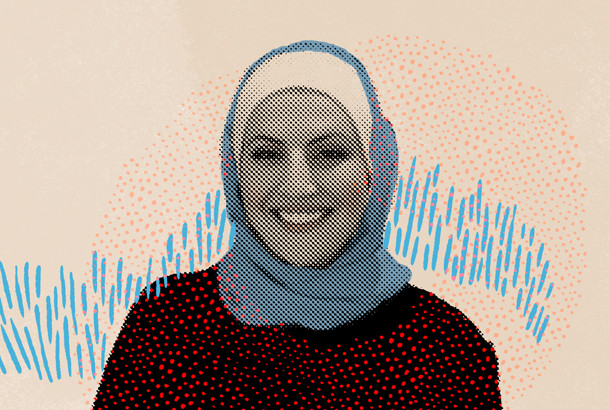
Islam Al-Aqeel (illustration by Vérane Cottin, photograph by CVT)
Batoul*, a young woman, was an art student at the University of Aleppo, Syria when she witnessed the bombing of her university in 2013. “I suffered severe psychological trauma leaving a difficult to heal scar in my heart,” she said. She claims that the bombing was orchestrated by the regime to put an end to the demonstrations that used to take place at the university. “It aimed to spread terror and fear.”
Like most people who experience trauma, the young woman carried her pain for many years. She finally received psychotherapy sessions with the support of the Center for Victims of Torture (CVT) Jordan.
Islam Al-Aqeel, a clinical psychologist and resilience programming trainer at CVT, helped her heal, gain strength and carry on with her life. “The walls of fear that had been in my chest for years were demolished, and I decided I would consider that day gone without return,” says Batoul.
Al-Aqeel has always strived to positively impact people’s lives and help them heal and overcome trauma. From working with people with mental disorders to working with Syrian refugees in Jordan, and now at CVT working with torture survivors, her ultimate aim throughout it all was to restore hope and help bring back light into the darkest of places.
Through her work, Al-Aqeel witnesses torture survivors regain their sense of identity and take control of their lives after they have been hopeless and helpless. Seeing the positive transformation that takes place during the counseling cycles is “among the most rewarding aspects of my work at CVT,” she says.
Working towards a world without torture
CVT Jordan is dedicated to providing comprehensive rehabilitation for torture survivors, advocating for an end to torture, and training partners to prevent torture and treat torture survivors. Every year, CVT assists up to 27,000 torture and war trauma survivors and family members. CVT helps them heal from their wounds and reclaim their lives.
The Center for Victims of Torture is an international nonprofit, founded in the United States, dedicated to healing survivors of torture and violent conflict by providing direct care for those who have been tortured, training partners who can prevent torture and treat torture survivors, and advocating for human rights and an end to torture. Since it was founded in 1985, CVT has rehabilitated over 33,000 torture and war trauma survivors through direct healing.
CVT Jordan was established in 2008, and now, with thousands of refugees fleeing wars and violence in the Middle East and Africa, their work is more important than ever. The Center adopts a holistic healing approach by providing access to mental health, physical therapy, social referrals, and case management. They also invest in capacity building and are dedicated to training local communities to be healers, advocates, educators, and trainers, just like Islam.
With support from the UN Voluntary Fund for Victims of Torture, CVT Jordan is able to continue working towards its vision of a world where torture ceases to exist and to continue healing the wounds of torture in survivors, their families, and their communities.
The Center for Victims of Torture (CVT) in Jordan was first funded by the UN Voluntary Fund for Victims of Torture in 2007.
Responding to Torture on the Border
MASUM (India)
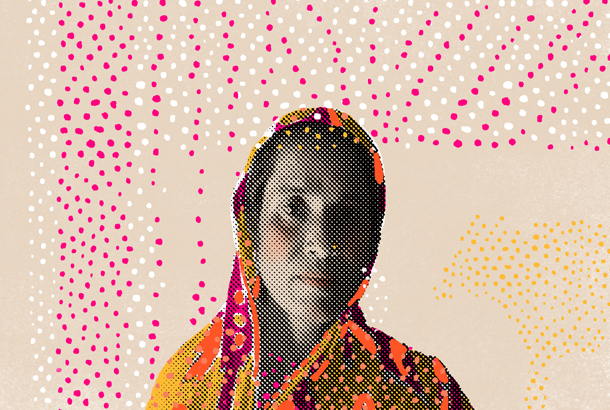
Survivor of torture (illustration by Vérane Cottin, photograph by MASUM)
One early morning in February 2021, Shah Alam, a Bangladeshi teenager, was last seen by his father planting Boro saplings in his field near the border between India and Bangladesh. Suddenly at noon, Indian Border Security Forces (BSF) came and took him away to an operations base not far from the dividing fence. Later that morning, the BSF members dumped him on the fence line, thinking he was dead. He wasn’t.
Found by locals, with injuries suggesting torture, Alam was taken to a nearby hospital for treatment and recovery. But Alam’s beating was not an isolated incident that year. Bangladesh’s authorities reported 10 extrajudicial killings and 19 incidents of torture and molestation carried out by BSF and other officials in several of West Bengal's districts. The victims were Muslims, Dalits and other minorities, including women and children.
In 2018, the High Commissioner for Human Rights denounced discrimination and violence directed at minorities in India. Further, in 2012, the Special Rapporteur on extrajudicial killings expressed concern that challenges with respect to the protection of the right to life in India were still considerable.
Protecting inhabitants of the border
Banglar Manabadhikar Suraksha Mancha (MASUM) believes that the extremely poor, marginalized and vulnerable communities of Bangladesh and India, especially Dalits, Adivasis, Muslims and women, are stripped of their liberties due to their lack of economic resources, political connections, legal awareness, and the discrimination they face. Because of this, they become easy targets for abusive government policies, including torture.
“Even after 76 years of independence, the socio-economic situations of the scheduled caste, the scheduled tribes, and other minority groups have not ended,” said Kirity Roy, the secretary of MASUM. “With each passing day, our fundamental rights guaranteed by the constitution are being denied by the governments.
Based in the State of West Bengal, MASUM partners and collaborates with organizations at the regional, national and international level to push for equality and justice, as well as to find solutions to many problems related to citizenship, land entitlements and social security, without which the lives of people on the border are tentative at best. For instance, MASUM has established monthly medical camps to offer health and psychological assistance to survivors of torture and the families of victims of extrajudicial executions.
With assistance from the United Nations Voluntary Fund for Victims of Torture, it has also established a permanent shelter offering accommodation, food, clothing, treatment and legal help to torture survivors, as well as a safe space that protects victims from facing further torture from perpetrators.
Additionally, MASUM has started mobilizing the border residents and organizing them into committees called Amra Simantabasi (We, the residents of the border) to lobby the state for the right of inhabitants of enclaves surrounded by other nations to remain. Lastly, MASUM seeks the intervention of human rights institutions and government ministries for the redress of injustice meted out against citizens.
“In the present situation, the lives of the people of the Indo-Bangladesh border are miserable. Present statistics reveal that around 150-200 persons are getting killed by the BSF ever year,” Roy said. “Residents of former Indian enclaves, who relocated to the Indian mainland are not yet provided with appropriate rehabilitation as promised.”
“However, among all these setbacks, peoples’ active movements… and the fighting spirit of the civil society brings a ray of hope amongst these difficult times.”
MASUM received its first grant from the United Nations Voluntary Fund for Victims of Torture in 2009.
VIEW THIS PAGE IN: